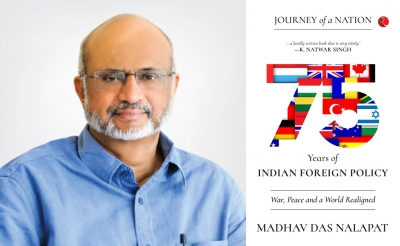'Move away from Lutyens Zone silos, soft options to achieve India's true global potential' (Book Review)
By IANS | Published: August 5, 2022 11:39 AM2022-08-05T11:39:04+5:302022-08-05T11:50:08+5:30
New Delhi, Aug 5 India needs to come out of the "silos" of the "Lutyens Zone", reverse its ...

'Move away from Lutyens Zone silos, soft options to achieve India's true global potential' (Book Review)
New Delhi, Aug 5 India needs to come out of the "silos" of the "Lutyens Zone", reverse its penchant for adopting the "soft option" on a plethora of issues and align itself with the changes in the "policymaking matrices" in countries like the US, Russia and China to ensure that the benefits of the rapid economic growth of the past few years are not "cast away", says noted academic and strategic analyst Madhav Das Nalapat in his visionary new book, "75 Years of Indian Foreign Policy".
The book, published by Rupa under the broad title "Journey of a Nation", also warns against "feeding the fringe" as this "seldom makes for good politics, as this group is impossible to satisfy unless one completely surrenders to their demands at the expense of the rest of society".
"The policymaking matrices in the US, Russia, Australia, Japan and even China have changed. The same needs to happen in India. These changes need to be comprehensive rather than, as has been the tradition in the Lutyens Zone, segmented into silos, with action by one leading to a dilution in the effectiveness of the action taken by another," says the book, which is sub-titled "War, Peace and World Realigned" adding that what is required are effective steps from the defence, home, commerce and finance ministries in this direction.
"The higher reaches of the government need to set a correct direction for our policymaking matrix rather than working towards all-round control," writes Nalapat, who was appointed India's first professor of geopolitics and subsequently the UNESCO Peace Chair by Manipal University and has previously edited The Times of India, and before that Matrubhumi.
Lamenting that those who have led India "have almost always pulled away from exploiting the consequences of a breakthrough," Nalapat writes that the 1974 Pokhran "peaceful nuclear explosion" ought to have, "in rapid succession, been followed up my more, rather than waiting until 1998 for another PM to find the resolve to go forward with another round of tests".
Noting that after the Pokhran tests, "there was a flurry of interest in India that, for some time, was reflected even in the growth of exports of manufacturing a country that could make a nuclear bomb could be depended upon to make the lathe", the author decries that even Atal Bihari Vajpayee, the Prime Minister at the time, declined to follow up on Pokhran II.
"There was a moratorium on further tests and India locked itself within most of the bounds of the Treaty on the Non-Proliferation of Nuclear Weapons although it was not a binding document."
"Avoiding risk and looking for the soft option has been the cause of much of the pain that India and its people have endured as a consequence of defective
Disclaimer: This post has been auto-published from an agency feed without any modifications to the text and has not been reviewed by an editor
Open in app